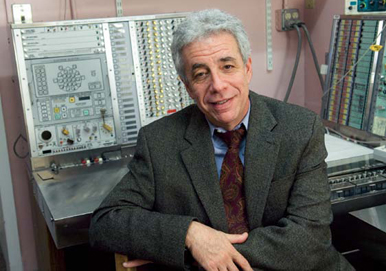Profs Probe the Science of Sleep
Part three: Helping patients get their Zs

Part three of a four-part series.
Teams of Boston University researchers are studying why we need sleep. That won’t help you get a good night’s rest, but spending a night at the Sleep Disorders Center at Boston Medical Center and the School of Medicine might. Run by Sanford Auerbach, a clinical neurologist and a MED associate professor, the clinic is for those who have serious sleeping difficulties. And it’s a busy place. When Auerbach took over the lab in 1988, maybe three people a week would come in for a sleep study. Now the four-bed lab is fully booked “and bursting at the seams,” he says. It’s not that all of a sudden there’s an epidemic of sleep disorders; instead, there’s wider awareness of both sleep problems and their solutions.
“The patient population we serve at the clinic is fairly diverse in terms of sleep disorders,” Auerbach says. Sleep-related breathing problems, such as sleep apnea, are the main issues, as well as narcolepsy, restless legs syndrome, insomnia, and sleepwalking, not to mention simply the “people who do odd things in the night,” he says.
Auerbach refers only some patients for a sleep study. (Not the insomnia patients, though: “I don’t need them not to sleep here if they don’t sleep at home,” he says.) Patients come in at night and a technician “wires” them up, pasting electrodes onto their heads to measure brain waves, eye movements, and muscle tone, and on their legs to check movement. Others measure heart rate and oxygen intake. “And you may think I’m crazy — how am I going to get these people to sleep? But they do,” Auerbach says.
Patients receive a treatment plan based on the findings. “In each one there are different regimens, certain things we know that work,” he says. “Part of it has to do with knowing not just the academic part, but knowing how patients react to their own sleep disorders and how they react to treatment options.”
But the disorders themselves are not always so easy to diagnose. Take insomnia, which has a two-part definition. The first is obvious: disruption of nighttime sleep, trouble getting to sleep, problems staying asleep. The second is just as obvious — “negative impact of daytime function” — but the first without the second doesn’t qualify as insomnia. “I saw a patient not too long ago who said he wasn’t sleeping well at night and wasn’t feeling well during the day,” Auerbach reports. “It turned out his nighttime sleep has always been that way, but he had only been having problems during the day for a year. So, in fact, that means he’d only had insomnia for a year. When he had no daytime function issues, there was nothing to treat. By definition, that’s not insomnia. That’s a short-sleep syndrome.”
For insomnia, treatment options vary. “Sometimes it’s just a matter of teaching people some strategies or other changes in their sleep behaviors. Sometimes it’s a matter of using cognitive-behavioral therapy; sometimes it’s medications,” he says.
Treatments for other sleep problems are occasionally very simple — and obvious. “You could come in to see me about being sleepy during the day,” Auerbach says, “and after talking with you and analyzing the problem, it turns out that the problem is that you simply don’t go to bed early enough.”
Sleep problems, he says, “need to be taken very seriously.” It’s not just being more alert so as to avoid falling asleep at inopportune times, like behind the wheel of the car. They may, he says, “lead to or be linked with heart disorders, obesity, high blood pressure, or diabetes.”
Check BU Today tomorrow to read part four of “Profs Probe the Science of Sleep.” Click here to read “Part one: Cracking the circadian code.” Click here to read “Part two: What dreams are made of.”
This article originally ran in the Winter 2006–2007 edition of Bostonia.
Taylor McNeil can be reached at tmcneil@bu.edu.